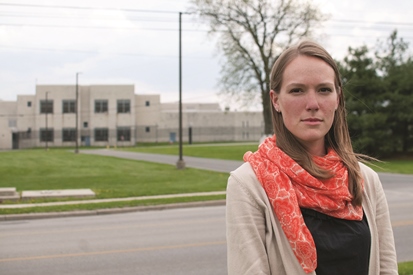
A Life or Death Case – With a Law Student by Her Side
By Sam Starnes
The timid, young African woman in the yellow prison garb facing immediate deportation from the United States looked like a teenager. “She was terrified,” said Marissa Mowery, then a second-year law student on a class visit to observe federal immigration hearings. “It was clear that she could have benefited from help.”
Mowery was in Widener Law Commonwealth Professor Jill E. Family’s immigration law survey course when she saw the young woman appear before the immigration court judge. “She really made an impression on our class,” said Mowery, a native of Erie, Pennsylvania, and a graduate of Grove City College north of Pittsburgh.
The young woman had escaped her home country after facing a life-threating situation involving a militant terrorist organization (the specific details of her story are being withheld to ensure her safety). She fled to South America, found her way to the U.S. border in Mexico where she presented her identification and asked for help. She was taken into custody by U.S. Immigration and Customs Enforcement, the agency more commonly known as ICE.
When Mowery first saw her on the class trip in November 2013, the young woman was being held behind bars in the York County Prison in Pennsylvania, awaiting a decision on whether she would get the opportunity for a political asylum hearing to stay in the United States or be sent back to her home country.
The judge granted her right to a hearing that day. Mowery assumed she would never see her again.
Mowery, an undergraduate Spanish major who before coming to law school in fall 2012 had taught English in the Dominican Republic, was cultivating an interest in immigration law. With Family’s help, she started an internship the following semester in 2014 with the Pennsylvania Immigration Resource Center (PIRC) based in York.
Family, a faculty member in Harrisburg for ten years who now directs the school’s Law and Government Institute, is renown for her immigration law expertise. In March, she testified on Capitol Hill regarding immigration policy before a U.S. Senate subcommittee. She also shares her insight on immigration law with her students, regularly taking classes to observe immigration court hearings. “It’s so hard to get a sense of a hearing unless you see it,” said Family, who served as a board member for PIRC.
The nonprofit agency based in York provides legal advocacy to immigrants fleeing persecution, to those challenged by mental health diagnoses, and to victims of domestic violence, sexual assault, and human trafficking. The agency, which has 11 staff members, attorneys, provides legal orientation and education to thousands of detained immigrants, and handles immigration cases. “Our mission is to provide access to justice for vulnerable immigrants,” said Mary Weaver, executive director of PIRC. Widener Law Commonwealth students from Harrisburg frequently fulfill internships with PIRC.
The agency offered Mowery the opportunity to assist with a political asylum hearing. She jumped at the opportunity, not knowing whose case she would handle. She was in for a surprise. “She came walking in the door and it was the same girl we had seen,” Mowery said.
Mowery began meeting with the young woman in the York County Prison, preparing to represent her in an asylum hearing scheduled for February 2014. “A lot of it at first was basically establishing rapport,” Mowery said.
She took a detailed statement from the client and worked with PIRC staff to write a brief for the court. The young woman, who is in her early twenties, faced serious danger if she lost her asylum case and was returned to her African home. “ICE detainees can be immediately deported,” Mowery said. “She could have been deported because she didn’t have the means to be here.”
Mowery said the young woman’s case fits an insightful description of immigration cases she has heard: “Every immigration case is like a death penalty case with the resources of traffic court.”
Mowery helped her prepare for the political asylum hearing, going over the details of her life and making sure there were no inconsistencies, a red flag for ICE attorneys. “Her story was complete—and it was horrific,” Mowery said.
The hearing lasted 45 minutes, with the judge, Mowery, and the young woman exploring in detail her request for political asylum. “It was the scariest thing I’ve ever done,” Mowery said.
At the end, the judge granted the young woman political asylum in the United States. “I was thrilled,” Mowery said. “I had put so much time and worry into this young woman’s case.”
The young woman was released that day. PIRC had arranged for a host family for her, and Mowery picked her up at the jail and drove her to the new home. “She was in shock a little bit,” Mowery said. “She kept saying, ‘I can’t believe I’m sitting in this car with you.’”
Mowery, who later worked in the summer and then on a part-time basis at PIRC, remained in touch with the young woman. The young woman is trying to build a life in America and also trying to reconnect with family who are scattered in refugee camps. “It was amazing to see the process all the way through,” Mowery said.
Mowery graduated with her juris doctorate in May and has relocated to San Diego with her husband, a Navy doctor. In July, she started a position with the American Bar Association’s Immigration Justice Project.
She plans on taking the bar in California and, inspired by her experience with the young woman and her coursework, hopes to work in immigration law, a field she finds to be very fulfilling.
“You can make a huge impact on somebody’s life,” she said. “It has global impact.”
